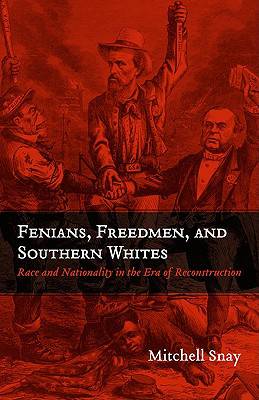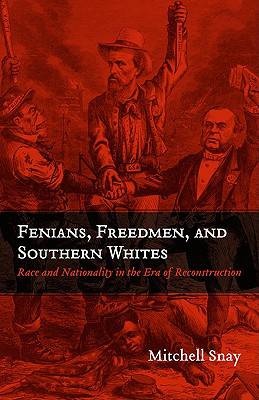
- Retrait gratuit dans votre magasin Club
- 7.000.000 titres dans notre catalogue
- Payer en toute sécurité
- Toujours un magasin près de chez vous
- Retrait gratuit dans votre magasin Club
- 7.000.000 titres dans notre catalogue
- Payer en toute sécurité
- Toujours un magasin près de chez vous
Fenians, Freedmen, and Southern Whites
Race and Nationality in the Era of Reconstruction
Mitchell SnayDescription
After the American Civil War, several movements for ethnic separatism and political self-determination significantly shaped the course of Reconstruction. The Union Leagues mobilized African Americans to fight for their political rights and economic security while the Ku Klux Klan used intimidation and violence to maintain the political and economic hegemony of southern whites. Founded in 1858 as the Irish Revolutionary Brotherhood, the Irish American Fenians sought to liberate Ireland from English rule. In Fenians, Freedmen, and Southern Whites, Mitchell Snay provides a compelling comparison of these seemingly disparate groups and illuminates the contours of nationalism during Reconstruction. By joining the Fenians with freedpeople and southern whites, Snay seeks to assert their central relevance to the dynamics of nationalism during Reconstruction and offers a highly original analysis of Reconstruction as an Age of Capital and an Age of Emancipation where categories of race, class, and gender -- as well as nationalism -- were fluid and contested.
After the American Civil War, several movements for ethnic separatism and political self-determination significantly shaped the course of Reconstruction. The Union Leagues, which began during the war to support the northern effort, spread to the South after the war and mobilized African Americans to fight for their political rights and economic security. Opposing the Leagues was the Ku Klux Klan, which used intimidation and violence to maintain the political and economic hegemony of southern whites. Founded in 1858 as the Irish Revolutionary Brotherhood, the Irish American Fenians sought to liberate Ireland from English rule. Mitchell Snay provides a compelling comparison of these seemingly disparate groups in Fenians, Freedmen, and Southern Whites, illuminating the contours of nationalism during Reconstruction. Despite their separate and often opposing goals, the Fenians, Union Leagues, and the Klan, Snay reveals, shared many characteristics. To various extents, they were secret societies that sought to advance their mission through both political and extra-political means. Both the League and the Klan employed elaborate rites of initiation and secret passwords common to nineteenth-century fraternal organizations. They also shared a similar political culture of secrecy, conspiracy, and countersubversion. All three groups were quasi-military in structure and activities and shared a desire for the control of land. Among the three organizations, Snay shows, the Fenians provide the clearest case of nationalist aspirations along the lines of ethnicity, though the rise of racial consciousness among both southern whites and blacks also might be seen as expressions of ethnic nationalism. According to Snay, the political culture of Reconstruction encouraged the nationalist ambitions of these groups, but channeled their separatist impulses along civil rather than ethnic lines by focusing on questions of freedom, citizenship, and suffrage. In addition, the Republican emphasis on color-blind equality limited overt expressions of national identities based solely on ethnicity or race.Unlike southern whites and blacks, Irish Americans are seldom mentioned in Reconstruction histories. By joining the Fenians with freedpeople and southern whites, Snay seeks to assert their central relevance to the dynamics of nationalism during Reconstruction and offers a highly original analysis of Reconstruction as an Age of Capital and an Age of Emancipation where categories of race, class, and gender -- as well as nationalism -- were fluid and contested.Spécifications
Parties prenantes
- Auteur(s) :
- Editeur:
Contenu
- Nombre de pages :
- 240
- Langue:
- Anglais
- Collection :
Caractéristiques
- EAN:
- 9780807137161
- Date de parution :
- 01-09-10
- Format:
- Livre broché
- Format numérique:
- Trade paperback (VS)
- Dimensions :
- 137 mm x 213 mm
- Poids :
- 340 g







